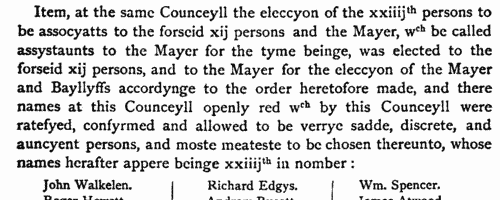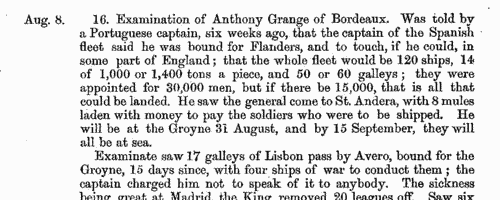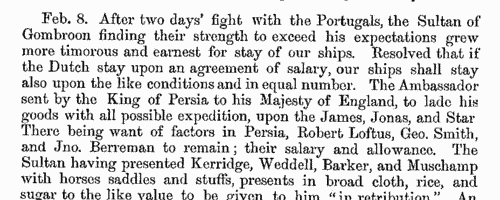Hixon Surname Ancestry ResultsOur indexes 1000-1999 include entries for the spelling 'hixon'. In the period you have requested, we have the following 60 records (displaying 1 to 10): Single Surname Subscription | | | Buying all 60 results of this search individually would cost £344.00. But you can have free access to all 60 records for a year, to view, to save and print, for £100. Save £244.00. More... |
These sample scans are from the original record. You will get scans of the full pages or articles where the surname you searched for has been found. Your web browser may prevent the sample windows from opening; in this case please change your browser settings to allow pop-up windows from this site. Staffordshire entries on the Assize, De Banco and Fine Rolls
(1307-1327)
Extracts of Staffordshire entries from these three series of records for the reign of king Edward II were made by Major-General the Hon. G. Wrottesley, and published by the William Salt Society in 1888. The justices in eyre (itinerant) holding assizes not only tried all civil actions outstanding on their advent, pleas of the crown and common pleas, but also interrogated the juries of each hundred and borough as to the Articles of the Eyre, inquiring into the king's proprietary rights, escheats, wardships, and questions of maladministration. The court of King's Bench (de Banco) sat in Westminster, similarly dealing with court cases brought in from throughout the country. The fine rolls record part of the government administration in England, with orders sent out day by day to individual officers, and commitment of particular responsibilities and duties. Wrottesley's extracts are far from exhaustive, as he confined his attention to those landed gentry families that he considered of importance.
HIXON. Cost: £4.00.  | Sample scan, click to enlarge

| Citizens of Oxford
(1509-1583)
These selections from the Oxford city records were printed in 1880 under the direction of the Town Clerk. Much of the material comes from the council minutes: 24 common councillors were elected out of the citizens at large each 30 September. Apart from the general administration of the city, a large number of cases involve people brought before the Council for using improper language, or other misbehaviour. There is an almost unbroken series of hanasters, or admissions to freedom of the city, listing the names of those who by purchase, birth or apprenticeship were admitted to the guild merchant.HIXON. Cost: £4.00.  | Sample scan, click to enlarge

| Official Papers
(1598-1601)
The State Papers Domestic cover all manner of business relating to Britain, Ireland and the colonies, conducted in the office of the Secretary of State as well as other miscellaneous records.
HIXON. Cost: £4.00.  | Sample scan, click to enlarge

| Liegemen and Traitors, Pirates and Spies
(1625-1626)
The Privy Council of Charles I was responsible for internal security in England and Wales, and dealt with all manner of special and urgent matters
HIXON. Cost: £4.00.  | Sample scan, click to enlarge

| British in the East
(1625-1629)
The East India State Papers centre on the records of the East India Company, trading to India, the East Indies, Persia and China. They include the Court Minutes of the East India Company.HIXON. Cost: £4.00.  | Sample scan, click to enlarge

| Immorality and heresy in Northumberland and Durham
(1626-1638)
Sexual and religious behaviour, marriage and probate were under the purview of the ecclesiastical courts in England at this period, exercised through the individual dioceses and archdeaconries. The diocese of Durham included the whole of county Durham, Northumberland (except for Hexhamshire) and Alston in Cumberland. The High Commission Court dealt with cases from the whole diocese, and a book of court acts from 1628 to 1639, and another of depositions from 1626 to 1638, survived in the dean and chapter library, were edited by W. Hylton Dyer Longstaffe, and published by the Surtees Society in 1858. This is not a complete abstract of the record: there are hundreds of cases for contempt of the ordinary jurisdiction, of which only a few were selected as examples 'in consequence of the rank of the persons proceeded against or other contents of interest'. However, all cases in which the nature of the offence occurs are traced from start to finish, but omitting much of the proceedings in between. The names and ages of all the deponents are recorded. HIXON. Cost: £4.00.  | Sample scan, click to enlarge

| PCC Probate Abstracts
(1652-1653)
The Prerogative Court of Canterbury's main jurisdiction was central and southern England and Wales, as well as over sailors &c dying abroad: these brief abstracts usually give address, date of probate and name of executor or administrator
HIXON. Cost: £2.00.  | Sample scan, click to enlarge

| Royalist delinquents in county Durham and Northumberland, their successors, tenants, debtors and creditors
(1648-1660)
King Charles I was executed 30 January 1649, the kingship was abolished and government by a Council of State was established 14 February 1649. Oliver Cromwell became Lord Protector 16 December 1653; died 3 September 1658; and was succeeded by his son Richard, who abdicated 24 May 1659. Charles II was established on the throne 29 May 1660. From 1648 to 1660 parliament sequestrated royalists' estates, restoring many by a process of heavy fines called compounding; this was administered by the Committee for Compounding, working through county committees. These raised considerable amounts of money, money which was vitally necessary for maintaining the parliamentary army's campaigns to subdue opposition in the three kingdoms - England, Scotland and Ireland. The raising and delivery of these monies was the responsibility of the Committee for Advance of Money (C. A. M.). The records of these committees were detailed and extensive, amounting to about 300 volumes, and were calendared for the Public Record Office by Mary Anne Everett Green. Abstracts of the county Durham and Northumberland entries were collated by Richard Welford with a manuscript transcript of the proceedings of the parliamentary commissioners in county Durham surviving in Durham cathedral library, and published by the Surtees Society in 1905. The persons named in these abstracts are not only the delinquents themselves, and those who succeeded them in their estates, but tenants, debtors and creditors, and local constables and officials of the committees.HIXON. Cost: £4.00.  | Sample scan, click to enlarge

| Surrey Sessions
(1661-1663)
Surrey Sessions Rolls and Order Books. These are abstracts of sessional orders, minutes of criminal cases, memoranda and other entries of record taken from the Order Books from October 1661 to January 1663, inclusive, and the Sessions Rolls for October 1661, January 1662, April 1662, July 1662, October 1662 and January 1663.HIXON. Cost: £4.00.  | Sample scan, click to enlarge

| Boys at Eton
(1441-1698)
King Henry VI founded a college at Eton in Buckinghamshire in 1440, 'to the praise, glory and honour of the Crucified, the exaltation of the most glorious Virgin His mother, and the establishing of holy Church His bride'. From this foundation has evolved the modern public school. Sir Wasey Sterry compiled a register for the college from 1441 to 1698, from a variety of surviving records, and including groundwork from his 'A List of Eton Commensals' of 1904, and R. A. Austen-Leigh's 'A List of Eton Collegers' of 1905. This resulting 'Eton College Register' was published in 1943. Because of the variety of underlying materials, the entries vary greatly in depth: some names survive only as a surname of not too certain date. In the fullest entries, the surname (often with a variant spelling) is given first, in bold, followed by the years of entry and leaving. The christian name is given next; then birthplace, and name of father. The initials K. S. (King's Scholar) indicate a scholar on the foundation. There will then follow a summary of the man's career, death, burial and probate; and the sources for the information, in italics, at the end of the entry.HIXON. Cost: £4.00.  | Sample scan, click to enlarge

|
Research your ancestry, family history, genealogy and one-name study by direct access to original records and archives indexed by surname.
|












